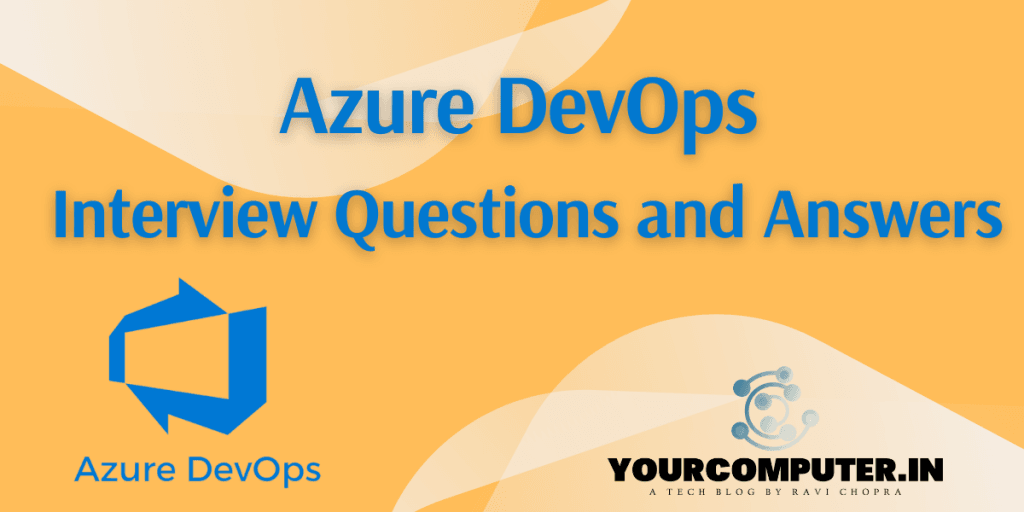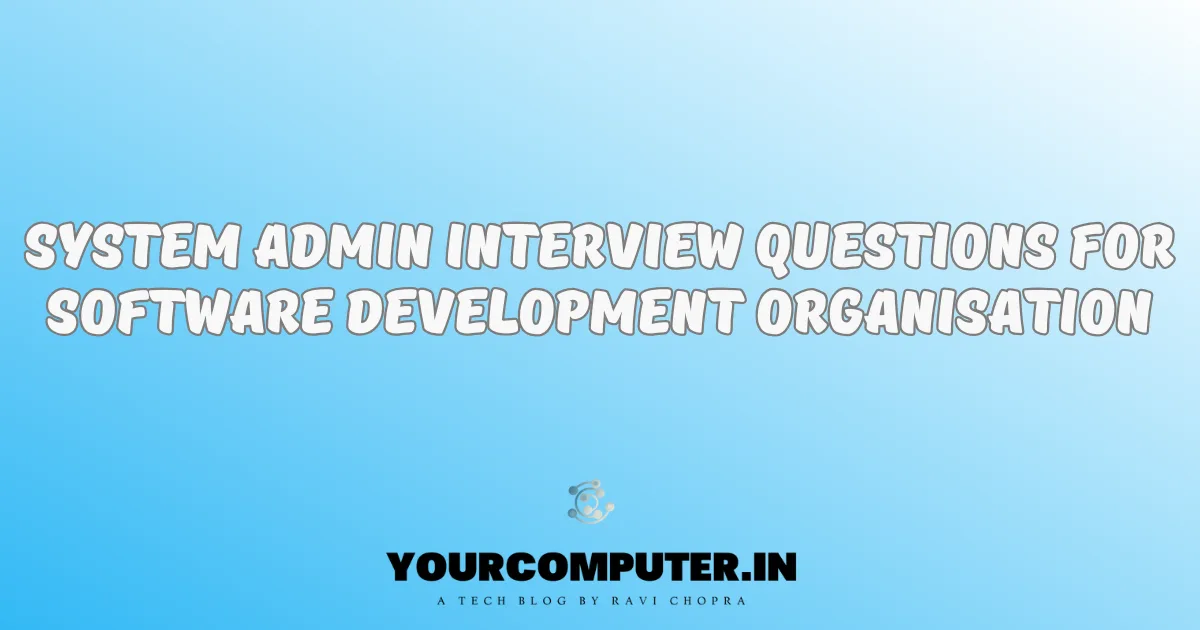Introduction: Azure DevOps is a powerful platform that facilitates the end-to-end development lifecycle, from planning to deployment and monitoring. Whether you’re preparing for an Azure DevOps interview or looking to enhance your knowledge, this blog provides 30 crucial questions and their answers to help you confidently navigate the interview process.
Below are the Top 30 Azure DevOps Interview Questions and Answers
1. What is Azure DevOps?
- Answer: Azure DevOps is a comprehensive set of development tools, services, and features that support the entire DevOps lifecycle. It includes version control, build automation, release management, and collaboration tools.
2. Explain Continuous Integration (CI) in Azure DevOps.
- Answer: CI is the practice of automatically integrating code changes into a shared repository, triggering automated builds and tests. In Azure DevOps, this is achieved through build pipelines.
3. What is YAML in the context of Azure Pipelines?
- Answer: YAML (Yet Another Markup Language) is used to define build and release pipelines as code in Azure DevOps. It allows version-controlled pipeline configuration for better traceability.
4. Differentiate between Azure Boards and Azure Repos.
- Answer: Azure Boards is a work tracking system for planning and tracking work, while Azure Repos provides version control services for managing source code.
5. How can you trigger a release in Azure Pipelines?
- Answer: Releases in Azure Pipelines can be triggered manually, on a schedule, or automatically after a successful build.
6. What is Azure Artifacts used for?
- Answer: Azure Artifacts is a package management system that allows you to create, host, and share packages, including NuGet, npm, and Maven packages.
7. Explain the concept of Azure DevOps Service Connections.
- Answer: Service Connections in Azure DevOps allow external services, such as Azure subscriptions or GitHub repositories, to be securely connected and accessed within pipelines.
8. How does Azure DevOps support containerization?
- Answer: Azure DevOps integrates with containerization tools like Docker, enabling the seamless creation, deployment, and management of containerized applications.
9. What is the purpose of Azure Test Plans?
- Answer: Azure Test Plans provide a comprehensive solution for manual and exploratory testing, including test case management, execution, and tracking.
10. Explain Azure DevOps Release Gates.
- Answer: Release Gates in Azure DevOps are conditions or checks set during a release pipeline, ensuring that specific criteria are met before proceeding with the deployment.
11. How does Azure DevOps handle secrets and sensitive information?
- Answer: Azure DevOps utilizes Variable Groups and Azure Key Vault integration to securely manage and store sensitive information, preventing exposure in pipeline configurations.
12. What is the role of Azure DevOps Service Connections in Kubernetes deployments?
- Answer: Service Connections facilitate the integration of Azure DevOps with Kubernetes clusters, enabling seamless deployment and management of containerized applications.
13. What is Azure DevOps Pipeline as Code?
- Answer: Azure DevOps Pipeline as Code allows defining and managing build and release pipelines using code, promoting version control and reproducibility.
14. Explain the purpose of Azure DevOps Repos Pull Request.
- Answer: Pull Requests in Azure Repos provide a mechanism for code review and collaboration, allowing team members to review and comment on proposed changes before merging.
15. How does Azure DevOps support multi-stage deployments?
- Answer: Azure DevOps Release Pipelines support multi-stage deployments, allowing sequential or parallel execution of deployment stages for complex release workflows.
16. What is Azure DevOps Service Endpoint?
- Answer: Service Endpoints in Azure DevOps enable secure connectivity to external services, such as Azure subscriptions or external repositories, within pipelines.
17. Explain the role of Azure DevOps Variable Groups.
- Answer: Variable Groups in Azure DevOps allow the central management of variables, ensuring consistent configuration across multiple pipelines.
18. How can you integrate Azure DevOps with external version control systems like Git?
- Answer: Azure DevOps supports integration with external Git repositories, enabling teams to use their preferred version control systems while benefiting from Azure DevOps services.
19. What are the key features of Azure Boards?
- Answer: Azure Boards offers features such as work item tracking, sprint planning, backlog management, and customizable Kanban boards for effective project management.
20. How can you trigger a build pipeline in Azure DevOps?
- Answer: Build pipelines in Azure DevOps can be triggered manually, on code commits, pull requests, or on a predefined schedule.
21. What is the role of Azure DevOps Artifacts Feed?
- Answer: Azure DevOps Artifacts Feed is a repository for storing and managing binary packages, allowing teams to share and version artifacts seamlessly.
22. Explain the difference between Azure DevOps Service Connection and Service Endpoint.
- Answer: While both provide connections to external services, Service Connections are used in pipelines for service-to-service authentication, while Service Endpoints connect to external systems for task execution.
23. How does Azure DevOps support compliance and auditing?
- Answer: Azure DevOps provides audit logs and compliance features, allowing organizations to track changes, manage permissions, and meet regulatory requirements.
24. What is the role of Azure DevOps Dashboard?
- Answer: Azure DevOps Dashboards provide customizable views of project data, including widgets for build status, work items, and other key metrics, aiding in project monitoring.
25. How does Azure DevOps handle branching strategies in Git?
- Answer: Azure DevOps supports various branching strategies in Git, such as GitFlow and GitHub Flow, allowing teams to choose the approach that best fits their workflow.
26. What is the purpose of Azure DevOps Marketplace?
- Answer: Azure DevOps Marketplace is a platform where users can discover and install extensions and integrations to enhance the functionality of Azure DevOps.
27. Explain Azure DevOps Environment and Resource Groups.
- Answer: Azure DevOps Environments provide a way to model and manage target deployment environments, while Resource Groups help organize resources within Azure.
28. How can you enforce branch policies in Azure Repos?
- Answer: Branch policies in Azure Repos enforce rules such as requiring code reviews, build validation, and status checks before allowing code to be merged into a branch.
29. What is the role of Azure DevOps Wiki?
- Answer: Azure DevOps Wiki is a collaborative space for documentation and knowledge sharing, enabling teams to create and maintain project documentation within the DevOps platform.
30. How does Azure DevOps support automated testing?
- Answer: Azure DevOps integrates with various testing frameworks, allowing the execution of automated tests as part of the build and release pipelines, ensuring code quality and reliability.
Conclusion: Mastering Azure DevOps is a key aspect of modern software development, and being well-versed in its features is essential for a successful DevOps career. These interview questions and answers aim to prepare you for discussions on Azure DevOps, ensuring you are ready to showcase your expertise in this versatile and robust platform.
More Interview Questions and Answers
Top 35 Azure AD Interview Questions and Answers
Top 50+ Active Directory Interview questions with answers
25 Challenging VMware Interview Questions with Detailed Answers
25 Must-Know Kubernetes Interview Questions and Answers
Top 40 Wintel Interview Questions and Answers
Top 10 AWS Interview Questions and Answers
Top 10 Google Cloud Platform Interview Questions and Answers
Windows Cluster Interview Questions and Answers
Top 10 Azure Cloud Interview Questions You Should Know
- Why should you automate Active Directory cleanup? - 17 June 2025
- Troubleshooting: Unable to Add Instance Failover Group to Azure SQL Managed Instance - 4 March 2025
- 10 Azure Virtual Desktop (AVD) Cost-Optimization Strategies for 2025 💡💰 - 22 February 2025


